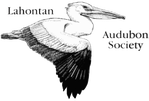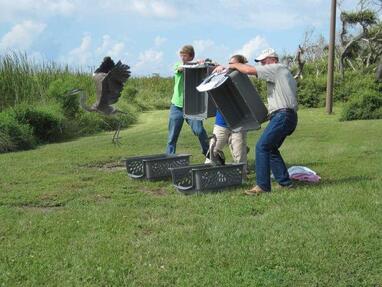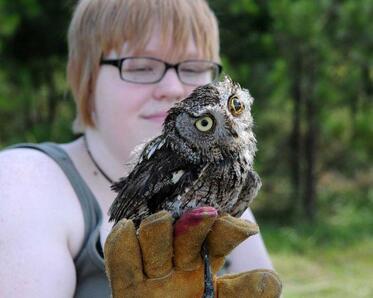|
by Jessica Wolff, the Nevada Department of Wildlife's Urban Wildlife Coordinator The Nevada Department of Wildlife often receives calls about injured wildlife and birds in the area. People connect with injured animals and want to help in any way they can. Unfortunately, in Nevada, there are not a lot of resources available for injured wildlife. In Northern Nevada, we have only one licensed rehabilitator. And while she moves mountains, she could use more help. So, what does it take to become a licensed rehabber in Nevada?Because of the need to protect wildlife from falling into the hands of inexperienced individuals, there is a permitting process that must be followed to legally rehabilitate animals in the state. The application for the permit is free but there are important requirements that must be met before one is issued. First, you must have at least 2 years experience working with a licensed wildlife rehabber. This must be clearly documented. In lieu of this experience, a letter from a licensed veterinarian who has experience working with wildlife will suffice - if they can confirm your rehabilitation skills. You must also enlist a licensed veterinarian willing to assist you with any rehabilitation efforts. So, if you think you might want to become a rehabber in the future, start making those relationships now! Or, if you are a veterinarian (or aware of one) who might be interested in serving in this role, contact NDOW and they can help connect you to a rehabilitator in need. Clear diagrams of where the animals will be housed are also required to ensure they are properly cared for. Here is the list of requirements for the State of Nevada Wildlife Rehabilitation Permit and the NDOW Application Form for a Wildlife Rehabilitation Permit. The permits are valid for two years and there is no fee to apply for Nevada. Not all animals can be rehabilitated. Per state law, coyotes, foxes, skunks, raccoons, rats, mice, ground squirrels and bats cannot be rehabilitated because they are a rabies vector species. But what about rehabbing birds?
How about financing rehabilitation?All rehabilitation efforts in Nevada are privately funded. The State of Nevada does not assist monetarily with rehabilitation efforts. Rehab efforts may be funded by the rehabbers themselves, donations, grants, and other non-profits. If you would like to donate, go to Dayton Valley’s Donate to our Cause page or to Lake Tahoe Wildlife Care’s donation page. How do I get experience?
About the AuthorJessica Wolff is the Nevada Department of Wildlife’s Urban Wildlife Coordinator. She fields calls from the public about injured wildlife, nuisance wildlife, and a variety of other issues. When it comes to birds (especially during the spring), she educates the public on issues dealing with nestlings, fledglings or protective parents! She also fields calls for injured birds, particularly hawks and owls. If available or able (due to Covid restrictions), she (or her Americorp volunteers) will help or coordinate picking up injured birds and transporting them to rehabilitation services. If no one from NDOW is available, she will advise the caller on what to do. If you would like more information on the permitting process for the State of Nevada permit or find an injured bird, please feel free to contact Jessica Wolff at 775-688-1501 or [email protected] |
topics
All
Archives
July 2024
|




 RSS Feed
RSS Feed